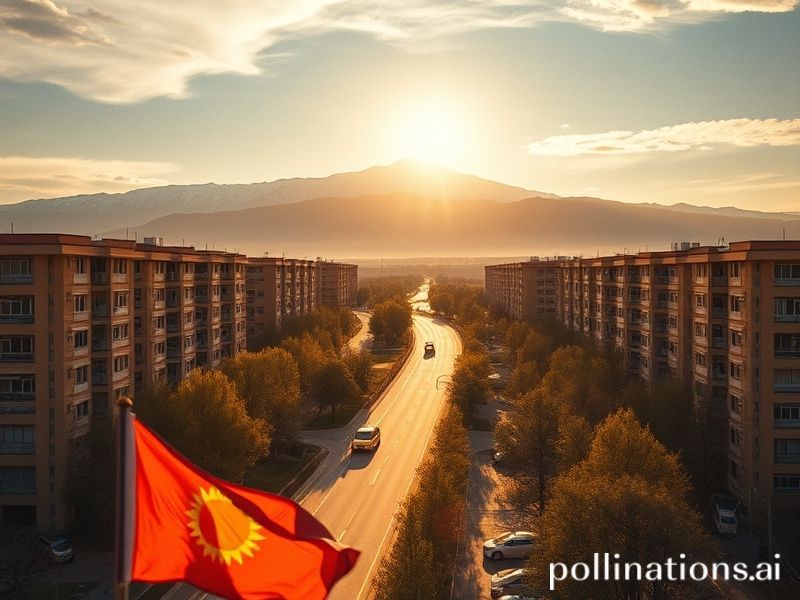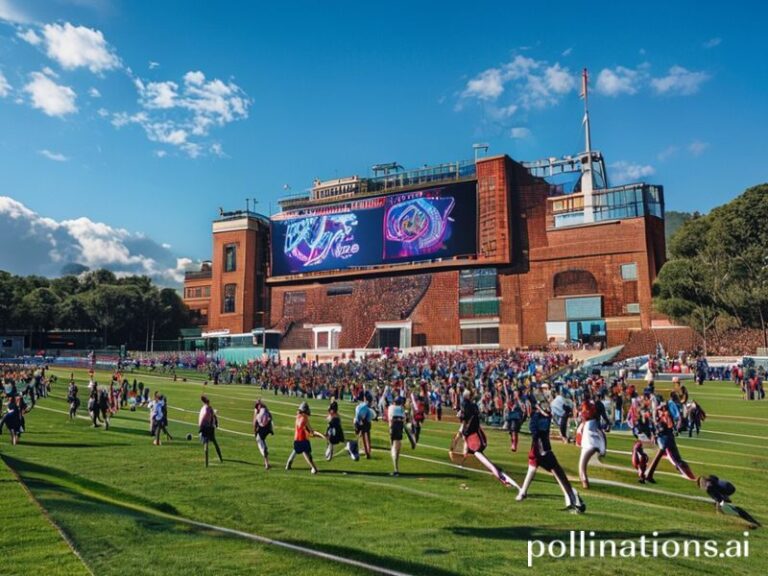Bishkek: The World’s Most Polite Geopolitical Knife-Fight
Bishkek – population roughly the same as Tucson, elevation slightly higher than Denver, and geopolitical relevance that keeps Washington, Beijing, and Moscow awake in shifts. To the casual atlas-flipper it’s just a vowel-heavy smudge between steppe and Tian Shan, yet this modest capital has become the world’s most polite knife-fight: all blades politely concealed beneath the tablecloth of post-Soviet protocol.
The city’s skyline, a half-hearted jumble of pastel ministries and 1970s panel housing, looks like it was designed by a committee that ran out of coffee and hope simultaneously. Don’t let that fool you. Under the cracked concrete, fiber-optic cables hum with the traffic of three competing empires. Russia still owns the gas valves, China owns the mortgage on tomorrow, and the United States—ever the nostalgic ex—drops by every few years to suggest democracy workshops nobody RSVPs to.
Walk down Chuy Prospekt at dusk and you’ll see the global economy in miniature: a Tesla nodding at a Lada, both stuck behind a Chinese BYD bus belching promises of carbon neutrality by 2035. Locals sip fermented mare’s milk beside Korean-run cafés serving oat-milk lattes to German NGO interns who will spend six months explaining gender pronouns to shepherds who already have forty words for “wind.” Everyone pretends the arrangement is temporary, like houseguests who’ve overstayed but keep bringing better snacks.
Bishkek matters because it is the place where the Belt and Road Initiative’s silk turns into asphalt. The new China–Kyrgyzstan–Uzbekistan railway, if it ever escapes the mire of feasibility studies and mutual distrust, will shave five days off the Europe–Beijing run and add roughly five decades of debt servicing to Bishkek’s grandchildren. Western analysts call this a “strategic chokepoint,” a phrase that sounds sexier in English than it does to the Kyrgyz trucker who just coughed up a bribe at the Kara-Suu border.
Meanwhile, the city’s youth—half the country is under twenty-five—stream TikToks in Russian, Korean, and meme-ified English, inventing identities faster than the ministries can print new passport stamps. They are the first generation raised on bandwidth rather than borders, which explains why protest culture here feels like Coachella with worse sound quality and better Molotov cocktails. Every few years the government falls, the plaza flowers get trampled, and CNN uses the same file footage of snow-dusted mountains to reassure viewers that somewhere, democracy is learning to walk in ski boots.
Climate change, never one for etiquette, has RSVP’d too. Glaciers in the Ala-Too range retreat uphill like aristocrats fleeing a revolution, leaving less water for downstream farms and more Instagram vistas for the rest of us. By 2050, experts predict Central Asia could lose half its freshwater; by 2051, boutique bottled “Pre-Melt Authentic Tian Shan Ice” will debut at Whole Foods for $12.99.
And yet, against the backdrop of superpower tug-of-war and ecological countdowns, Bishkek insists on minor, stubborn miracles. The city’s bazaars still run on gossip and handshake contracts more binding than any WTO ruling. Strangers will invite you for tea with the unspoken understanding that you may be a spy, but you’re definitely cold. Even the corruption has a certain egalitarian flair: everyone pays the same unofficial surcharge, adjusted only for inflation and the quality of your poker face.
In the end, Bishkek is what happens when the 21st century tries to park in a 19th-century garage: the mirrors get clipped, the exhaust smells of cumin, and somehow the engine keeps turning over. If you want to see the future’s rough draft—equal parts Chinese circuitry, Russian muscle memory, and American daydreams—book a ticket. Just bring cash, a VPN, and a sense of humor dark enough to match the tea.







